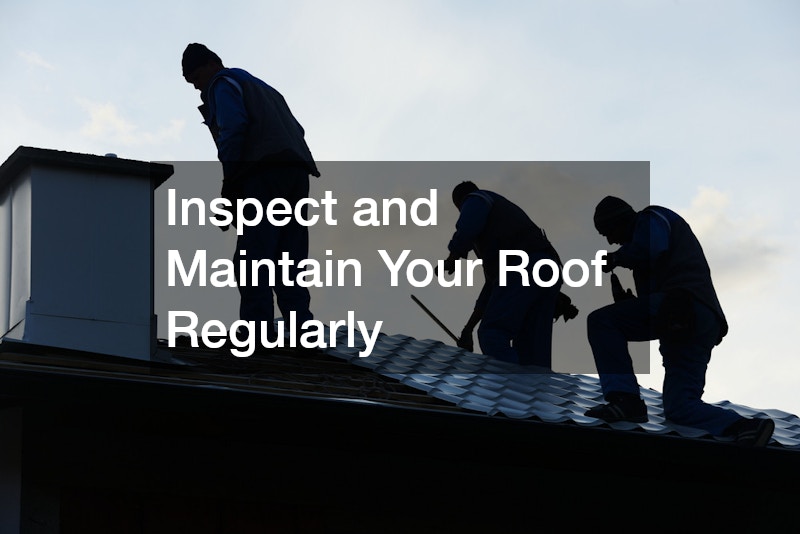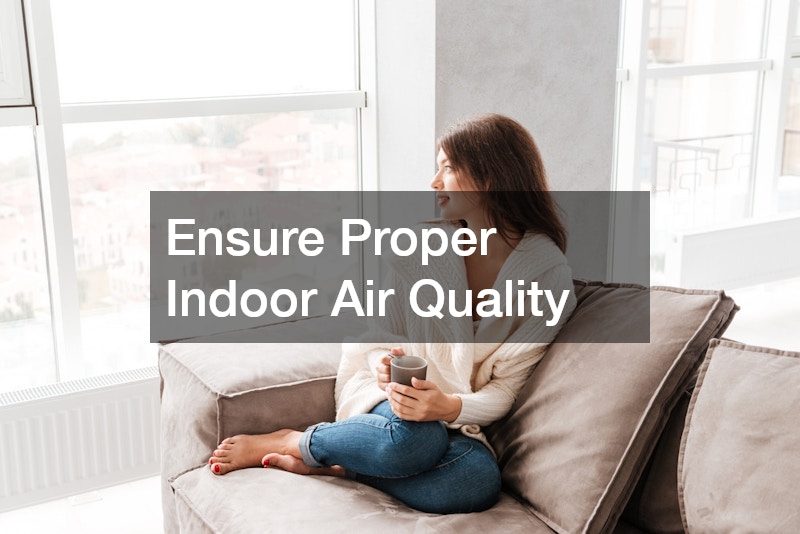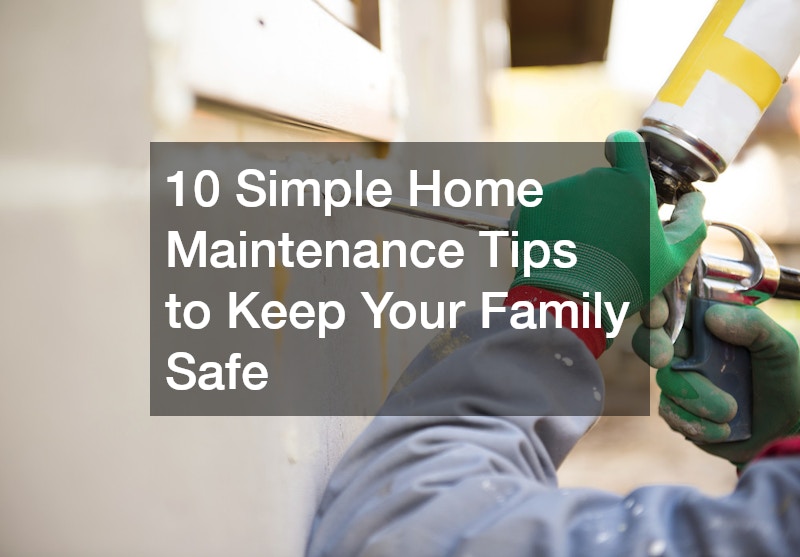A safe home is the cornerstone of a happy and healthy family. Regular maintenance not only keeps your home looking its best but also prevents minor issues from escalating into costly and dangerous problems. From ensuring a sturdy roof to maintaining clean air and functional systems, every part of your home plays a role in protecting your loved ones.
Neglecting routine upkeep can lead to hazards such as mold growth, pest infestations, or structural damage, all of which can compromise your family’s safety and comfort. Fortunately, with simple and consistent efforts, you can keep your home in excellent condition and create a secure environment for everyone.
This guide outlines 10 essential home maintenance tips to help safeguard your family. Whether it’s scheduling roof replacement or upgrading safety features, these practical strategies will help you prioritize safety while enhancing the longevity and functionality of your home.
1. Inspect and Maintain Your Roof Regularly

Your roof is one of the most critical components of your home, acting as the first line of defense against the elements. Regular inspections and maintenance ensure it remains in good condition, protecting your family and belongings from leaks, weather damage, and structural issues. Look for signs of wear, such as missing shingles, water stains on ceilings, or sagging areas, which may indicate the need for immediate attention.
If you notice significant damage, it might be time to consider a roof replacement to maintain the safety and integrity of your home. For smaller repairs or routine upkeep, professional roofing services can help address issues efficiently and extend the lifespan of your roof.
Scheduling seasonal inspections, particularly after severe weather, ensures you catch potential problems early, saving you time, money, and unnecessary stress. A well-maintained roof keeps your home safe and your family comfortable.
2. Keep Pests Out of Your Home
Pests can pose serious risks to your family’s health and the structural integrity of your home. Rodents, termites, and insects can carry diseases, contaminate food, and cause extensive damage to walls, furniture, and electrical wiring. Preventing infestations starts with keeping your home clean and sealing potential entry points, such as cracks, gaps around doors, and unsealed vents.
Regular pest control is a vital step in maintaining a pest-free environment. Professional services can identify problem areas, eliminate existing infestations, and provide preventive treatments to keep pests at bay. Additionally, ensure proper storage of food, dispose of trash promptly, and remove standing water to discourage pests from settling in.
By taking these proactive measures, you can protect your home from the damage and health risks associated with pests. Keeping pests out contributes to a cleaner, safer, and more comfortable living space for your family.
3. Ensure Proper Indoor Air Quality

The air inside your home significantly impacts your family’s health and comfort. Poor indoor air quality can lead to respiratory issues, allergies, and other health concerns, especially for children and elderly family members. Common pollutants include dust, pet dander, mold, and chemical fumes from household products.
To improve air quality, start by regularly cleaning air ducts, vacuuming carpets, and using air purifiers. Replace HVAC filters every three months to ensure your system circulates clean air effectively. If you suspect mold growth, hire professionals to address the issue promptly. Adding houseplants can also help, as many plants naturally filter toxins from the air.
Proper ventilation is key, so make sure exhaust fans in kitchens and bathrooms are functional and use them consistently. Prioritizing air quality improvements not only creates a healthier environment but also enhances your family’s overall well-being and comfort.
4. Service Your HVAC System
A well-functioning HVAC system is essential for maintaining a comfortable and safe home environment. Heating and cooling systems regulate temperature and humidity, preventing mold growth and improving air quality. Neglecting maintenance can lead to inefficiency, higher energy bills, and even system breakdowns during extreme weather.
Schedule annual inspections and routine servicing to ensure your HVAC system operates at peak performance. Regular AC repair and maintenance, such as cleaning coils, checking refrigerant levels, and replacing filters, can prolong the life of your unit and prevent costly emergency fixes.
Simple actions, like keeping vents clear and sealing gaps around windows and doors, enhance your system’s efficiency. If your HVAC system is outdated or struggling to meet your needs, consider upgrading to a more energy-efficient model. By prioritizing HVAC care, you can enjoy consistent comfort while protecting your family from health risks associated with poorly regulated indoor climates.
5. Upgrade and Maintain Fencing for Security

Fencing plays a vital role in enhancing your home’s security and privacy while keeping children and pets safe within your property. Over time, fences can deteriorate due to weather conditions, pests, or general wear and tear. Regular maintenance, such as repainting, treating for rust, or replacing damaged panels, ensures your fence remains sturdy and functional.
If your fence is outdated or beyond repair, consider new fence installations to improve safety and curb appeal. Modern fencing options include durable materials like vinyl, steel, or composite wood, which require minimal upkeep and provide long-lasting protection.
Additionally, choose designs that align with your home’s aesthetic while prioritizing security features like reinforced gates or taller structures. Upgraded fencing not only boosts your property value but also gives your family peace of mind, creating a secure and welcoming outdoor space for everyone to enjoy.
6. Test Plumbing Systems and Handle Emergencies
A functional plumbing system is essential for maintaining a safe and hygienic home environment. Regularly testing your plumbing can help you identify potential issues, such as leaks, blockages, or water pressure problems, before they become major disasters. Check for signs of leaks around faucets, toilets, and pipes, and monitor water flow to detect any irregularities.
If you encounter a plumbing emergency, such as a burst pipe or backed-up sewer, it’s crucial to act quickly. Calling professional emergency plumbing services can prevent further damage and restore your home’s functionality. Regular inspections and prompt repairs not only protect your home’s infrastructure but also avoid costly repairs down the road.
In addition to immediate fixes, it’s wise to install shut-off valves and keep contact information for reliable plumbers on hand. Ensuring your plumbing system is in good working order keeps your home running smoothly and prevents emergencies from escalating.
7. Repair and Replace Garage Doors as Needed
Garage doors are often overlooked but play a crucial role in the safety and security of your home. A malfunctioning garage door can be both an inconvenience and a security risk, leaving your home vulnerable to theft or damage. Regularly inspect your garage door for signs of wear, such as uneven movement, strange noises, or broken springs.
If repairs are needed, it’s important to address them promptly. For issues like broken cables or tracks, it’s best to call a professional to ensure proper functioning. In cases where the door is beyond repair, garage door replacement may be necessary. Upgrading to a newer, more secure model can improve your home’s security, energy efficiency, and curb appeal.
Maintaining your garage door not only protects your home and family but also extends the life of your garage door, preventing costly repairs or replacements down the line.
8. Prevent and Address Mold Growth
Mold growth in your home can lead to health issues, including respiratory problems and allergies, as well as structural damage. To prevent mold, control humidity levels by using dehumidifiers and ensuring proper ventilation, especially in high-moisture areas like bathrooms, kitchens, and basements. Regularly inspect for signs of mold, such as discoloration or a musty odor, and address any leaks or water damage immediately.
If you discover mold, it’s crucial to act quickly. In many cases, professional mold removal services are necessary to effectively eliminate mold and prevent it from spreading. These experts use specialized equipment and techniques to clean affected areas and restore a safe living environment.
Taking proactive steps to prevent mold growth, combined with prompt action if mold is detected, ensures the health and safety of your family while protecting your home from damage.
9. Focus on Kitchen Safety and Upgrades
The kitchen is one of the busiest and most hazardous areas in the home, so safety should always be a priority. Start by ensuring that sharp objects, such as knives, are stored securely and out of reach of children. Keep flammable materials away from the stove and make sure smoke detectors are in working order.
In addition to safety, upgrading your kitchen can improve functionality and enhance its aesthetic appeal. Consider consulting a kitchen designer to maximize space, improve workflow, and create a more comfortable and efficient environment. A professional designer can help you choose non-slip flooring, install better lighting, and design cabinets that prevent clutter.
These simple safety measures and upgrades not only protect your family but also make your kitchen a more enjoyable and functional space for cooking and entertaining.

